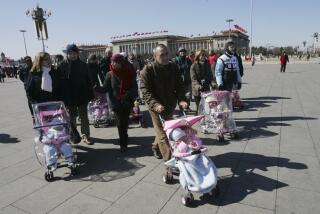Ruling Is Tearing Families Asunder
HONG KONG — As the elderly woman told her tale, tears rolled down her cheeks and spilled onto the patterns of her wrinkled silk blouse.
Through the hurt, 72-year-old Tse Kam-ying explained how her only son had departed for mainland China two days earlier under a deportation order, leaving her bewildered and alone except for one gnawing fear: that she will die at home and no one will know.
“I have no one now,” she stammered. “I don’t know how the government can be so cruel.”
Tse’s story is among the many personal tragedies in one of Asia’s most heart-wrenching immigration battles: the fight of thousands of children born in mainland China to live with their parents and siblings who are legal residents of Hong Kong.
Honor student Kao Lai-sha’s plight of being pulled away from her mother, father and three sisters is one of several cases that have drawn local media attention in recent days. According to one report, 49 teachers and her school’s headmaster signed a letter pleading that the 18-year-old be granted residency in Hong Kong on humanitarian grounds.
As in the other instances, both Tse’s son and Kao were ordered to leave Hong Kong because of a Jan. 10 court ruling upholding the principle that those born in mainland China before their parents became residents of the territory had no right to residency.
As a special administrative region of China since 1997, Hong Kong is especially attractive because residents enjoy many of the rights of a democratic society in addition to a far more affluent lifestyle than that available to most people in the Communist-ruled mainland.
Under pressure to restrict immigration, the Hong Kong government has offered no leeway now that the time has come to enforce the ruling. The judgment means that about 5,000 sons and daughters of Hong Kong residents must go back to the mainland. More than 2,000 other people believed to be affected by the ruling also must depart.
The government has pledged to act firmly to expel rejected residency applicants--known as “abode seekers”--who have ignored the official March 31 deadline for departure.
“The government will take restrained but firm action to remove claimants in batches in an orderly fashion,” Hong Kong’s deputy secretary for security, Michael Wong, told reporters Monday, the day after the deadline passed.
No one in the first two batches of about 80 individuals apiece called for deportation Monday and Tuesday by the region’s Department of Immigration showed up. On Tuesday, one of the organizers of the fight against the deportation order, a Roman Catholic priest named Franco Mella, advised those named in the first batches not to participate in protest actions but to remain at home.
Those refusing to leave face fines and possible jail terms once they are deported, according to reports from the mainland.
Despite a series of legal setbacks in a battle that has lasted nearly five years, Mella believes that time and justice are on his side.
“It’s a basic and sacred human right for families to be allowed to live together,” he said in an interview Tuesday. “That means that eventually we will win.”
Mella claims that the government exaggerated the number of mainland children who, like Tse’s son, returned ahead of the deadline to avoid punitive measures. He says the majority of those threatened with expulsion have remained.
“That’s very encouraging,” he said.
On Tuesday, the priest led a march to Hong Kong’s highest court and also requested a meeting with officials at the Security Bureau to explore possible concessions.
“We still believe there are those in both [the Hong Kong and Beijing] governments who want a softer line on this,” Mella said. “We are not giving up.”
Hong Kong government officials claim that they are not anti-family but are simply bound by legal rulings. Spokesman Stephen Lam noted that the government permits controlled immigration of more than 54,000 people into Hong Kong from the mainland each year.
Lam said that under this program, an agreement had been reached with Beijing that anyone under 18 who is deported would be processed for permanent residency within a year. But he and other officials acknowledged that the wait for others, such as Tse’s son, would be far longer--possibly as long as a decade.
More to Read
Sign up for Essential California
The most important California stories and recommendations in your inbox every morning.
You may occasionally receive promotional content from the Los Angeles Times.










